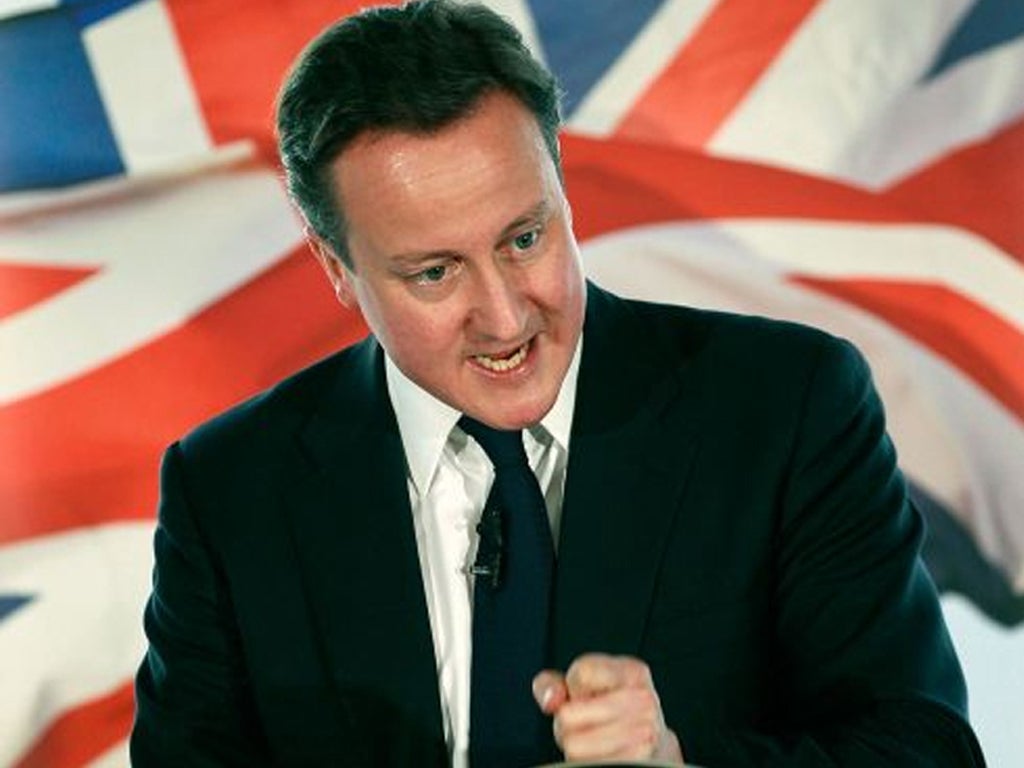Andrew Grice: PM lags behind in rush to embrace moral markets
Inside Westminster


Your support helps us to tell the story
From reproductive rights to climate change to Big Tech, The Independent is on the ground when the story is developing. Whether it's investigating the financials of Elon Musk's pro-Trump PAC or producing our latest documentary, 'The A Word', which shines a light on the American women fighting for reproductive rights, we know how important it is to parse out the facts from the messaging.
At such a critical moment in US history, we need reporters on the ground. Your donation allows us to keep sending journalists to speak to both sides of the story.
The Independent is trusted by Americans across the entire political spectrum. And unlike many other quality news outlets, we choose not to lock Americans out of our reporting and analysis with paywalls. We believe quality journalism should be available to everyone, paid for by those who can afford it.
Your support makes all the difference.Vince Cable has felt under siege in recent weeks as other politicians try to invade his turf. On Tuesday, the Business Secretary will unveil the Government's measures to tackle excessive executive pay and change the culture of company boardrooms.
Amid rising public anger about corporate greed, politicians of all colours have queued up to call for responsible, popular capitalism and "moral markets". Not that we would expect them to advocate irresponsible, unpopular capitalism and immoral markets, of course.
Mr Cable even had to fend off a raid by his own party leader. Nick Clegg "shook the tree" to see which of Mr Cable's measures he could announce in his own speech on capitalism this week. Mr Clegg was handed only a twig – his call for a "John Lewis economy".
Mr Cable's defence of his territory also explains why David Cameron's long-awaited foray into the debate was short on policy prescriptions. The Business Secretary insisted on providing those next week. Downing Street had sweated for weeks over the speech Mr Cameron delivered on Thursday. Although it seemed to lack hard policies, it was more revealing than it looked.
Mr Cameron's address was a much more passionate defence of markets than Labour had expected. He did not filch any of Ed Miliband's ideas. While markets had to be fair as well as free, Mr Cameron insisted that "open markets and free enterprise can actually promote morality". The speech was refreshingly honest; Mr Cameron did not pretend to be something he is not.
The Prime Minister argued that the Conservatives are best placed to make markets work fairly because they understand and believe in capitalism. There is now clear water between him and Mr Miliband, who claimed this week that centre-left parties are better placed to meet the challenge – provided they face fiscal reality and find new ways for governments to take on "predatory practices and vested interests". This seems optimistic. At a time when Europe's economy is in turmoil, 24 of the 27 EU governments are run by the centre-right, encouraging the theory that voters turn to conservative politicians in hard times.
However, Mr Miliband can feel vindicated as he has dragged Mr Cameron on to his ground. When the Labour leader made his "producer versus predator" speech last September, Mr Cameron and George Osborne rubbed their hands with glee about how left-wing it was. Yet the opinion polls and the more far-sighted Tory MPs have forced them to enter the debate and reform the system to head off the impression that they are in business to defend their friends in the City, who provide about half of the Tories' donations.
Mr Miliband won a similar tactical victory by identifying Britain's "squeezed middle", which is now at the heart of the political debate. The votes of this group will almost certainly decide the next election.
I suspect the "squeezed middle" will be more interested in what politicians offer to help them rather than their thoughts on capitalism. After a wobbly few weeks, Mr Miliband got back into his stride as he tackled the trade unions when they reacted angrily to a warning by Ed Balls that public-sector pay restraint must continue.
Mr Miliband needs more of the same. Labour is only at first base on winning back economic credibility. Voters will not be much interested in Mr Miliband's plans to change the rules of the economic system until they judge Labour credible enough to run it.
The Prime Minister is not a natural revolutionary. As Labour has taken to reminding us, he is the son of a stockbroker. The Liberal Democrats have found him less "open for business" than Mr Osborne when it comes to reforming the banks and the boardroom. Mr Clegg and Mr Cable had to fight hard to stop Downing Street introducing barmy proposals to limit flexible working by Adrian Beecroft which would have made a mockery of the Government's goal to be the most family-friendly ever.
The campaign to strip Sir Fred Goodwin, the former Royal Bank of Scotland boss, of his knighthood offered Mr Cameron an easy headline, a convenient diversion from tricky matters on his watch like the RBS bonuses to be announced soon. The voters will be watching to see if the reality matches his rhetoric.
Join our commenting forum
Join thought-provoking conversations, follow other Independent readers and see their replies
Comments